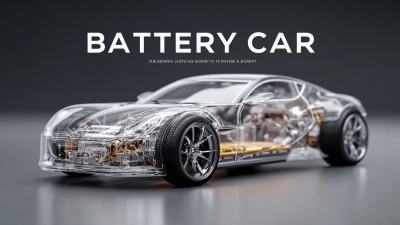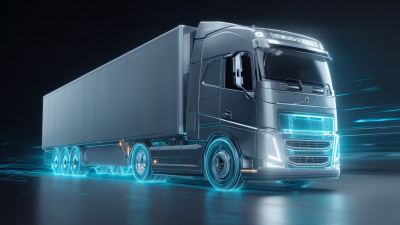Leave Your Message
In today's competitive market, Auto Dealers face unprecedented challenges, requiring them to adopt innovative strategies to maximize sales and effectively engage customers. According to a recent J.D. Power report, dealer satisfaction with the sales process has plummeted to a five-year low, with only 74% of customers stating they are highly satisfied with their dealership experience. Moreover, research from Statista indicates that the automotive industry is projected to reach over $2 trillion in revenue by 2025, highlighting the immense potential for growth amid fierce competition. To thrive within this landscape, Auto Dealers must leverage data-driven insights, enhance their digital presence, and foster meaningful relationships with buyers. This guide will outline essential tactics that Auto Dealers can implement to not only survive but flourish in today’s dynamic marketplace.

The current automotive market landscape is marked by rapid transformation and heightened competition.
Dealers face the challenge of adapting to evolving consumer preferences, where technology and sustainability play pivotal roles. Electric vehicles (EVs) are no longer a niche market; they have entered the mainstream, prompting dealerships to revise their inventory and sales strategies. Understanding these trends is crucial for dealers aiming to stay relevant.
Embracing digital tools and providing a seamless online shopping experience
can significantly enhance customer engagement and satisfaction.
Furthermore, the rise of online marketplaces has reshaped how consumers approach vehicle purchases. Shoppers now expect transparency in pricing and a wealth of information at their fingertips. Dealers must leverage data analytics and employ targeted marketing strategies to attract and retain customers in this digital age.
Addressing challenges such as supply chain disruptions and regulatory changes also requires agility and innovation.
By navigating these complexities and recognizing emerging trends, auto dealers can position themselves for success and thrive in today’s competitive environment.
In today's competitive market, auto dealers must leverage digital marketing strategies to attract and retain customers effectively. One of the most powerful tools at their disposal is email marketing. By utilizing targeted email campaigns, auto dealers can communicate directly with potential buyers, offer personalized deals, and keep their audience informed about new inventory, promotions, or finance options. This direct line of communication not only helps build relationships but also enhances customer engagement, leading to increased sales conversions.
Moreover, integrating social media marketing into the overall digital strategy can significantly amplify outreach. Auto dealers can showcase their vehicles through captivating visuals and engaging content that resonates with their target audience. Utilizing platforms like Instagram and Facebook allows dealers to share customer testimonials, promotional events, and unique selling propositions that differentiate their offerings. These social platforms create an interactive environment where potential customers can ask questions and receive prompt responses, fostering a sense of community and loyalty towards the brand. As the digital landscape continues to evolve, embracing these strategies is essential for auto dealers looking to thrive in a saturated market.
| Marketing Strategy | Importance Level (1-10) | Estimated ROI (%) | Implementation Time Frame |
|---|---|---|---|
| SEO Optimization | 9 | 300% | 3-6 Months |
| Social Media Advertising | 8 | 250% | 1-3 Months |
| Email Marketing Campaigns | 7 | 400% | 1 Month |
| Content Marketing | 8 | 350% | 3-6 Months |
| Pay-Per-Click Advertising | 9 | 200% | Immediate |
In today's competitive auto dealer market, enhancing customer experience is crucial for driving sales growth. Innovative technologies and services play a pivotal role in this transformation. According to market reports, the global UX services market is projected to grow from $64 billion in 2025 to approximately $549.3 billion by 2032, reflecting a robust compound annual growth rate of 36%. This growth underscores the increasing importance of customer-centric design and services in the automotive sector, enabling dealers to better understand and meet consumer needs.
Furthermore, businesses across various industries, including BFSI, IT, and retail, are leveraging advanced technologies such as AI to optimize operations and improve customer interactions. For instance, companies investing in omnichannel engagement strategies are experiencing significant benefits. Research indicates that 70% of customers prefer engaging with brands through multiple channels, making it essential for auto dealers to adopt a seamless omnichannel approach to enhance customer satisfaction and loyalty. As auto dealers continue to navigate evolving market dynamics, prioritizing innovative service development and cross-channel marketing will be vital for maximizing sales and maintaining a competitive edge.
This chart illustrates the sales performance of auto dealers over the four quarters of 2023, highlighting a steady increase in sales volume. This trend emphasizes the importance of maximizing customer experience through innovative technologies and services to sustain growth in a competitive market.
In today's competitive auto dealer landscape, effective inventory management is pivotal for enhancing sales performance. Industry reports indicate that optimizing inventory can increase sales efficiency by up to 25%, allowing dealers to respond promptly to market demands. With the current economic climate leading to mixed financial outcomes for various companies, the focus on streamlined inventory practices becomes even more critical. For instance, maintaining the right stock levels reduces holding costs and mitigates the risks associated with overstock or stockouts.

Moreover, leveraging advanced technology in inventory management, such as ERP systems, can significantly improve operational efficiencies. Research highlights that 70% of businesses that implemented ERP solutions reported increased insights into their inventory performance, enabling more strategic decision-making. As auto dealers face a challenging market with fluctuating revenues, from a modest 3.3% increase in revenue in recent reports, effective inventory management emerges as a key strategy to navigate these challenges and enhance overall sales efficiencies in 2025 and beyond.
In today's competitive car dealership market, building stronger relationships with customers is essential for fostering long-term loyalty. To achieve this, dealerships need to prioritize personalized experiences. Tailor your communication to address individual customer needs and preferences. A simple way to do this is by utilizing customer relationship management (CRM) tools that track interactions and preferences, allowing you to follow up meaningfully.

Additionally, transparency and honesty in your dealings can significantly enhance trust. Always provide clear information regarding pricing, financing, and vehicle history. Customers appreciate being well-informed, which makes them feel secure in their purchasing decisions. Consider implementing regular check-ins post-sale to ensure satisfaction and address any concerns.
Finally, creating a community around your dealership can strengthen customer loyalty. Host events—whether it's a car show, a charity drive, or informational workshops—and invite your customers. These gatherings not only promote engagement but also make customers feel valued as part of a larger community, encouraging them to return for future purchases and recommend your dealership to friends and family.






